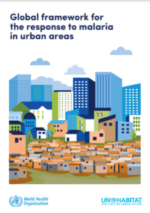DEEP DIVE
Urban Malaria
10/11/2020
31/07/2024
This is an active Deep Dive and we welcome your contributions! If you are currently involved or planning research activities on Urban Malaria please contact MESA (mesa@isglobal.org) or add your project to the database.
——
Malaria is a disease of poverty and is mainly transmitted in rural areas where the malaria vector finds a conducive environment for breeding.
A wide consensus regards a decrease in malaria transmission with urbanization as it leads to improved infrastructure, better quality housing i.e. “mosquito proof”, increased access to quality healthcare, and a reduction in vector breeding sites. However, this is not the case and malaria cases are on rise in urban areas. Population migration from rural to urban or semi-urban areas is one of the influencing factors affecting urban malaria transmission. Whereas, location, climate, land use, local vector species and their breeding sites, waste management, and local malaria intervention programs are some of the other factors influencing malaria transmission in urban and semi-urban areas. Characterization of epidemiological and entomological drivers of urban malaria requires an integrated approach for a better understanding of malaria transmission in urban and semi-urban settings.
This deep dive aims to review the current landscape of research in urban and semi-urban malaria by systematically collecting data of recent and ongoing research projects.

Total
projects

Total funding
amount


